Most of this morning was the mad race to finish the posters for Susan. Apart from a quick Scrabble break to give the Sharpies a chance to recover and get the marker fumes out of my lungs I got them all done by 3pm. Susan was out of her office so I dropped them off with a colleague instead. I also got a chance to sneak a peek at Mum and Emma's puppetry lesson.
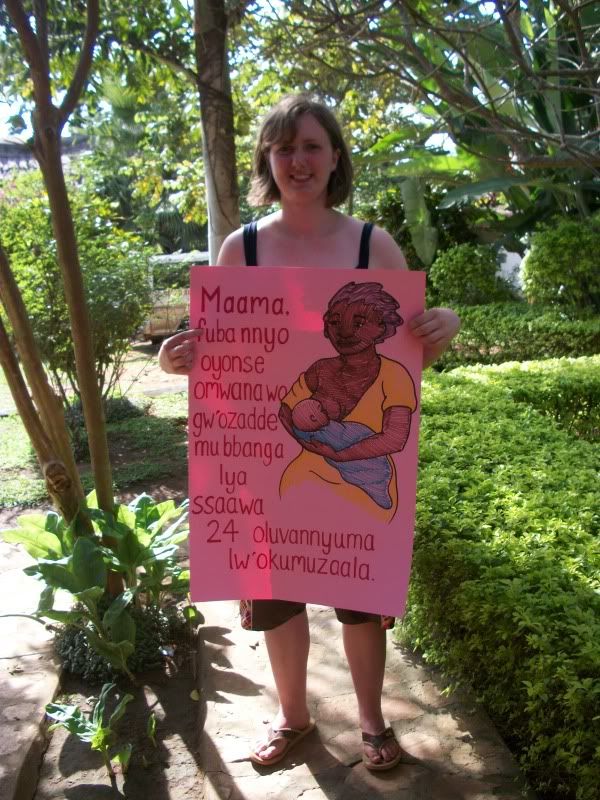 |
| One of the 10 posters. There's an 18 letter word in one of them. Seriously! 18 letters! |
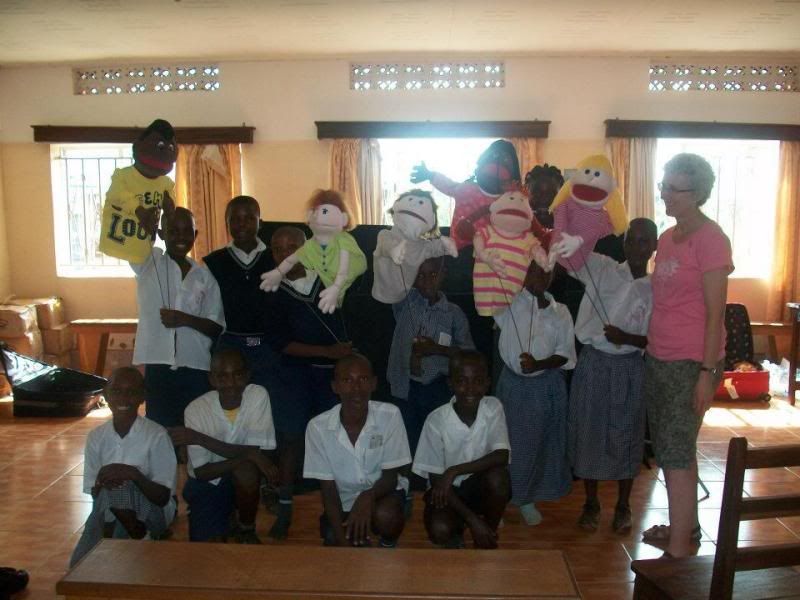 |
| The Kabubbu puppetry class, passing with flying colours |
Said goodbye to Elisha, the world's simultaneously most amusing and frustrating protégé (he always approaches you with a grin, and he's the friendliest guy but he is a bit absent minded) and to Enoch and Lilian, who I have come to like very much. They're such a caring couple and I can't think of anyone better for the roles they have here.
Drove back to Entebbe via Kampala where I spent most of the traffic jam trying to get a decent photo of a Marabou Stork – it will happen! - and noting down weird shop names. As a mostly Christian/slightly Muslim county a lot of the shop owners try to draw you in with religious, or sometimes just amusing names!
• Psalm 23 Manicure and Pedicure (Get the fingernails of a sheep?)
• God's Will Hardware (You can't shop anywhere else. Wouldn't want to defy God's will!)
• Blessed Furniture Shop
• Holy Supermarket
• Winners Chapel (Losers go to the other chapel)
• Share sex salon (We're pretty sure they meant unisex... I certainly hope they meant unisex!)
• Stone Crushing Ugandaland (The world’s most exciting theme park?)
• We sell diary (with a picture of a cow underneath)
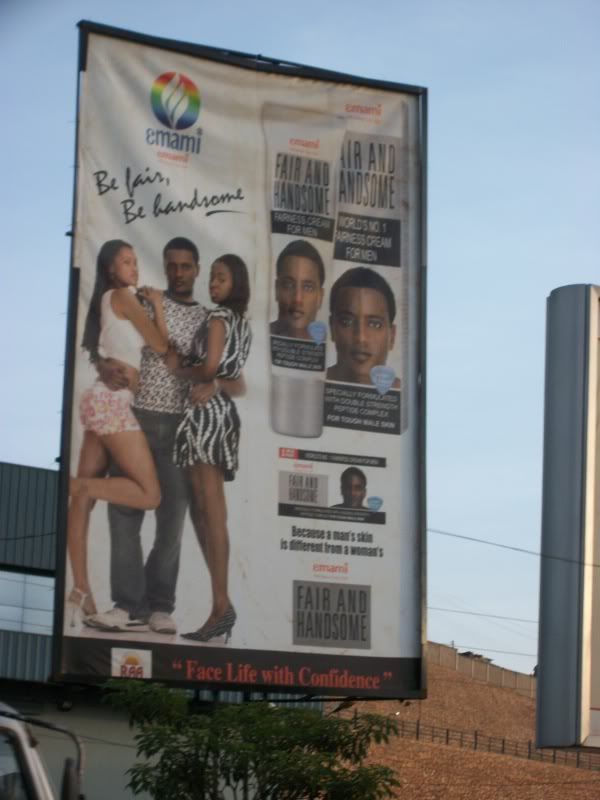 |
| Billboard for 'Fair and Handsome' - another of Kampala's peculiar advertisements |
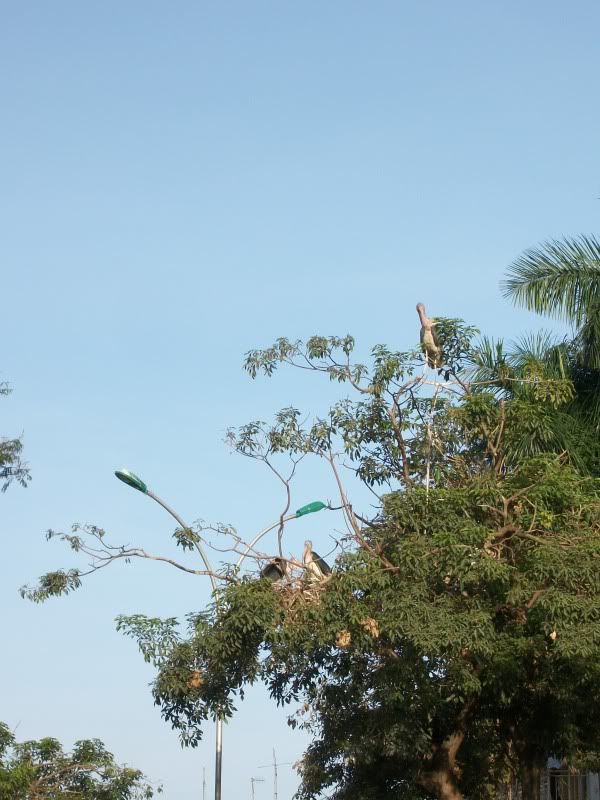 |
| Miraculously, a tree full of storks! |
Stuck in traffic for several hours, we resort to Eye Spy, which turns out to be hilarious. Geoff's a good sport so he joins in too. He, Steve and Dave and all be very funny. When Steve laughs too hard he does a little snort, which makes me laugh too. It like it, it's a good indicator of how funny your joke was!
More soberingly, we drive through an area where kids were being kidnapped recently to be used in sacrifices. Even in the 'modern' city there's still superstition. We pass an albino lady who reminds me of Ivan, the albino boy at the high school in Kabubbu. Without his education he would probably have become an outcast. In women's rights too, Uganda has a long way to go. Wife-beating is a big problem, and the other day I saw an advert for “Men”, essentially a male version of Loose Women in which male panellists were discussing how to get away with sleeping consecutively with all your female interns. You can imagine my outrage, I'm sure. There are problems in Kabubbu too, of course. As a mzungu and under the reputation of the resort we're all pretty safe as long as we behave ourselves but there are problems with men meeting to drink and scheme in the town centre before going robbing or fighting. A nine year old girl was hung from a roof beam by her stepfather and beaten black and blue but the corrupt local councillor came down on the side of the father, and a woman was axed in the head after she failed to save a mother and newborn and was proclaimed a witch. QT are hoping to have police in there soon, because it's even dangerous for guys who try to do the right thing, like Enoch who was called to the scene of the axing and who, with his wife, took in the little girl. And like James the carpenter who reported the perpetrators of the witch incident and received threats of death in his own workplace. These are incredibly brave men and women to have devoted themselves to this village for so long and to have risked so much. It's very humbling.
I also get a chance to asked Geoff about Joseph Kony in light of the recent Kony2012 campaign that went round Facebook and was then so heavily criticised. Most of the reports I'd seen were from western sources so it made sense to quiz someone with a better knowledge of Uganda. According to Geoff, Kony has been active for about 20 years, raiding villages and either mutilating children or forcing them to kill their own parents so that, because of their crime of murder, they are committed to the Lord's Resistance Army (LRA) which he runs. He operated mainly in northern Uganda until the government managed to persuade him to go elsewhere – but that didn't stop him from committing atrocities. Consequently he's been round a few of the neighbouring countries, got kicked out of some of them, but at the moment the Ugandan government is hoping that he will stop in return for his freedom. This is seen by many as a terrible, unjust idea and the International court wants him arrested rather then offered amnesty.
That's the situation as it stands, and Invisible Children’s idea of resolving the situation with Kony is to lobby governments in the west to put pressure on the Ugandan government to prioritise finding and arresting him so that he can be put on trial by the International court. Regarding the criticisms of the charity I personally think it's very reasonable that a third of I.C.'s funds go into marketing rather than rehabilitation programmes for the kids. It's not enough simply to pick up a bad man's mess after him, they are asking their political representatives to help them achieve goals they can’t meet on their own. Fair enough. However the question has never been whether or not Kony needs to be stopped, but rather, 'Is I.C.’s idea of how to find and catch Kony the most effective one?’ Given that he’s no longer in Uganda, and that the campaign didn’t really address the politicians in the neighbouring countries either the answer would appear to be no. But then what is the most effective way? And additionally, ‘Is social media the most effective way to campaign?' In one sense I.C.’s viral video was a success as I’d certainly never heard about Kony before and I did show it to some of my friends, but in another sense probably not. Live forums like Twitter and Facebook are all about sharing a moment, and so tend to fall prey to fads. I remember seeing the video on a lot of Facebook walls, but how many of us have committed ourselves any further than that. I believe that desire to help does come from a good place, but sometimes our well-meaning enthusiasm can get the best of us and we don’t think the problem through before we act? So what is the solution to a man like Kony? Awareness is certainly part of it and I.C. has already made some great progress, but I feel that whatever the rest of the solution is will be measured in years as part of a long and painstaking process, not an overnight victory like many of us would like to imagine. If I’ve seen one thing in Kabubbu, it’s that while the results are worth it, fighting for change is a fraught and complex balancing act.
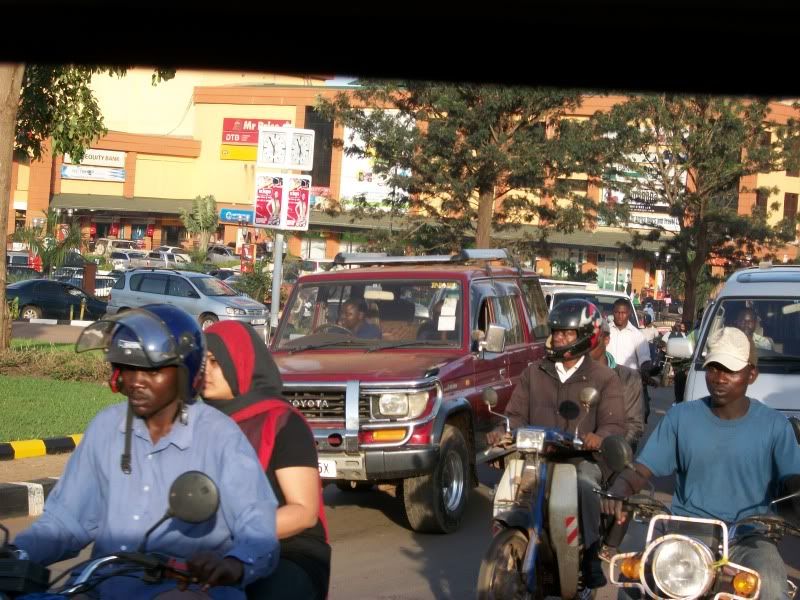 |
| None of this traffic is moving. |
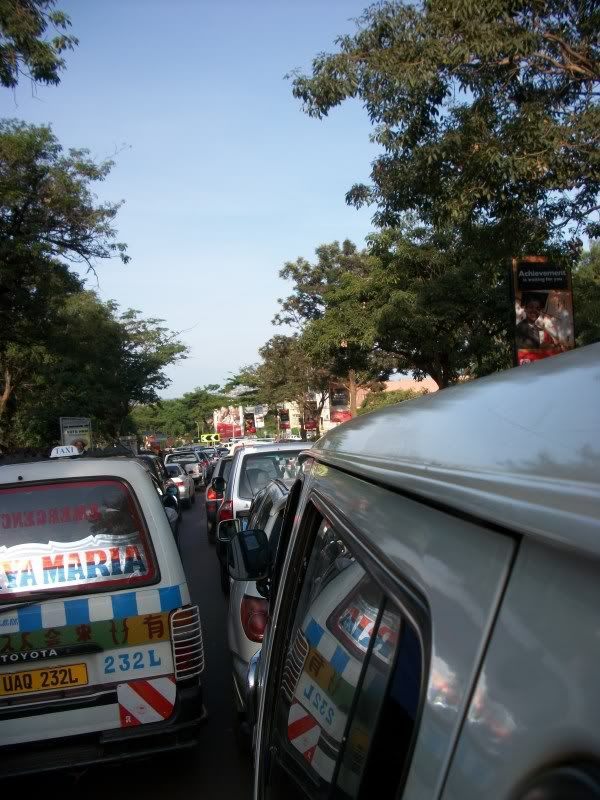 |
| Nor is this. |
We got to the hotel and after ten days spent in the simple comfort of our banda everything seems too big and frivolous and luxurious. Emma and I reach our room and freak out over it all for a few minutes. The room alone is the size of two bandas together, beds are big enough for three, the sink is glittery, the TV is mounted on the wall – it’s all too much! I shower quickly, then dress again to have dinner and realise my clothes still smell of the village – wood smoke and sweat, banana leaves, and the cling of small dusty children. It seems too soon to be going back. I settled in so quickly, but the time we've had here, even being able to contribute, in some ways just wasn't long enough.

No comments:
Post a Comment